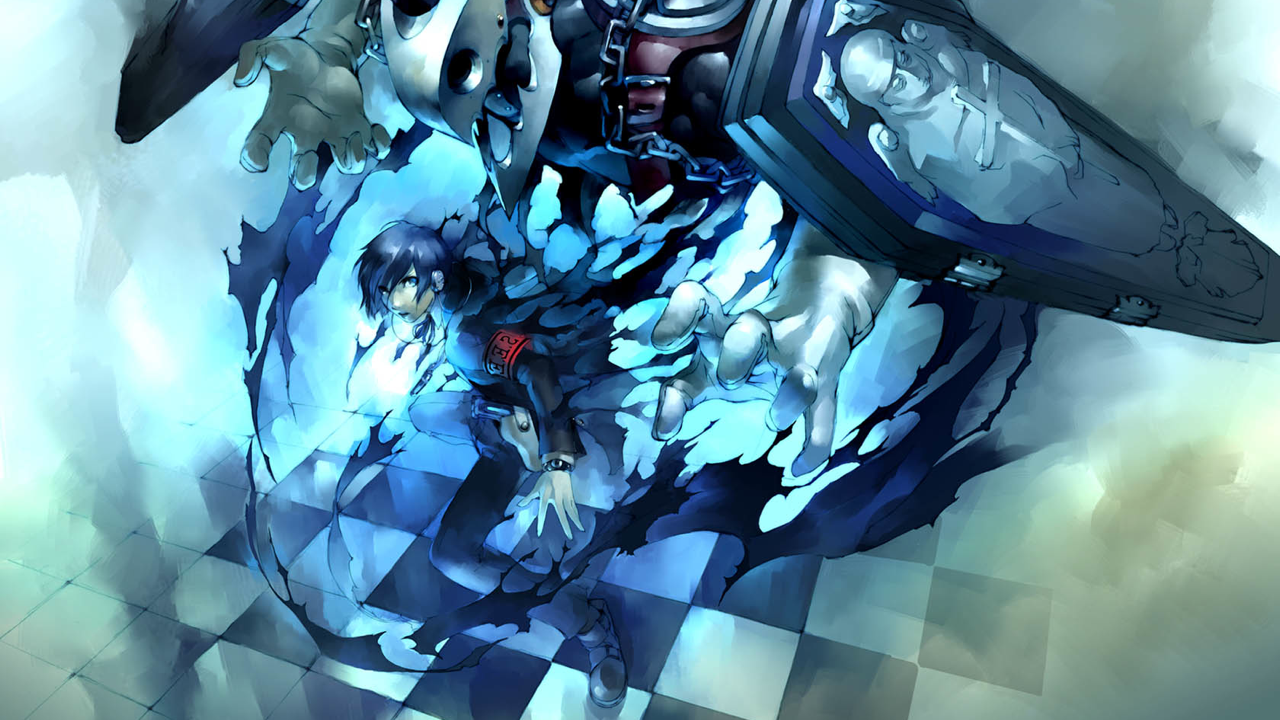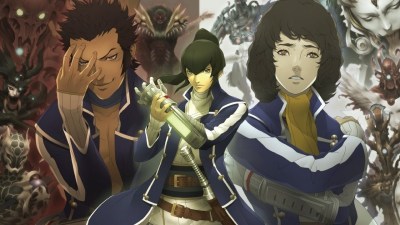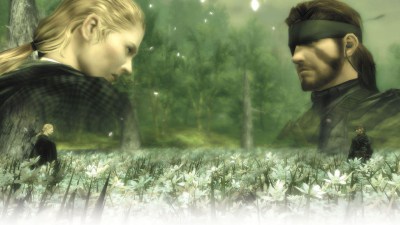Much of Persona 3 has you fumbling in the dark.
The leader of a small group of high schoolers living on Tatsumi Port Island, you’re besieged from all angles by an odd disease known as Apathy Syndrome. Over time, people go from their day to day lives to becoming husks, and it’s up to you to figure it out.
You see, at the end of a day -the stroke of midnight, to be precise - the world changes. Those who can’t feel it sleep through it. But those who can experience something surreal, dangerous, and potentially fatal.
There’s a 25th hour. The “Dark Hour”, they call it, and wild, monstrous things roam the streets during this time. On this 25th hour, space and time sheds normalcy to reveal a leviathan of a moon, held up by thin strands of silvery clouds. Like an ancient god, nestled in its cradle, the Dark Hour’s moon sits lazily in a twisted, turquoise sky.
Coffins litter the streets and everywhere there is a peculiar, foreboding, oppressive grimness. This isn’t like the TV world from Persona 4, changing form according to its host’s fears. This is a projection of something else, something inhuman.
And it’s up to your team to stop it.
Persona 3 has the same hero premise as Persona 4: you’re a transfer student who leads a small group of high schoolers to fight monsters. In the course of a year, your task is to stop the malevolent Shadows living in a nightmarish tower called Tatarus.
But what separates Yu Narukami from Minato Arisato (or whatever you name Persona 3’s protagonist) is the coincidence of leadership. Narukami, for all his might, is thrust into a role of leadership and given his power by chance: Izanami gave him that ability. It’s a seemingly random designation. Though he had a visit from Igor and Margaret in the Velvet Room, there’s nothing that elicited him the powerful Wild Card ability. It was a string of coincidences and exceptionalism that underlined Persona 4’s otherwise impressive story and characters.
In Persona 3, Arisato’s greatness was born from tragedy. Part of it is because of his backstory: whereas Narukami’s parents are gone for work, Minato’s parents are dead. He’s quieter and calmer than Narukami (believe it or not). Also, while Narukami has family in the form of Dojima and Nanako, Minato depends upon his friends and the people he comes across for familial support. In terms of blood kin, he’s all alone.
But that only gets at a small part of him. Like Narukami, it doesn’t address his exceptional abilities. He’s special, but for much of the game you don’t know why. At odd nights he’s visited by a boy in jailbird clothing named Pharos, but you don’t know why. Of all your team members, he’s the only who has access to the Wild Card, but you don’t know why.
Narukami is just considered special, a juggernaut of pheromones and stoicness. He’s a man with greatness thrust upon him, coincidentally and conveniently present in Inaba to solve its problems, defeat its monsters, and woo its women.
For Minato, there’s something that calls to him, some mystery that brings him back to the Moonlight Bridge, to Tatsumi Port Island, to Tartarus. He isn’t a force of nature, but a hero that seeks closure, even if he doesn’t know it.
At the center of this mystery is Aigis, an Anti-Shadow Weapon / robot schoolgirl whose initial appearance is marked with bubbly enthusiasm and enamour for Minato. Though Aigis isn’t entirely sure why, something about him draws her in. For the most part she’s a compliant friend with a mechanical lilt, quirky obtuseness, and a special, unknown relationship. Nothing about her stands out. Nothing is cause for worry.
On November 9th, 2009, a laid-back, slick-haired, scarf-donning transfer student comes to Gekkoukan High School. He quickly becomes the class darling, and to Aigis’ chagrin, he stirs up a considerable amount of buzz. To Aigis, something about him feels off, but she doesn’t know why. Enter Ryoji Mochizuki.
For a month, their relationship is unclear. But on a fateful December night, a snowless, chilly Dark Hour, Aigis goes to confront Ryoji at the Moonlight Bridge.
“Something terrible has happened here, and yet I feel at peace.” Ryoji ominously states, his voice hiding some secret.
Aigis doesn’t have any of it. She speaks to Ryoji as if he’s already familiar with the Dark Hour. “Have you forgotten?” She asks.
“Forgotten what?” Ryoji asks back.
“The Dark Hour - a time period in which few people are active.” There’s a distinct pause in the game, not too short, but not too long. The dawning realization has an appropriate, dramatic pause. It’s not coded into the game, it’s not voiced, but you can feel it nevertheless: that pause. The encapsulation.
“But you, you’ve somehow adapted to it…too well for a human, in fact.” She says.
There’s something wrong.
The confrontation on the Moonlight Bridge is where Minato Arisato differentiates himself from Yu Narukami: he’s no longer an avatar for the player, but a character. He’s a breathing human being with a backstory, failures, and most importantly, a reason for his greatness.
“You are the Shadow I sealed away ten years ago!” Aigis yells at Ryoji.
By the time the group gets to her, she’s already disabled, defeated, on her knees. She remembers everything, the source of her distrust of Ryoji, the source of her affection for you, and the reason behind it all.
But it isn’t Aigis who explains it to you. She breaks down before that happens. Instead, it’s Ryoji, who’s still hanging around the Moonlight Bridge. With equal parts confidence and regret, Ryoji faces the group. The group’s uneasy. It’s Mitsuru - the former leader - who asks the most important question.
“Who are you…WHAT are you?”
Without skipping a beat, Ryoji gives her the truth. “I’m the same as the beings you call Shadows.”
He is an accumulation of Shadows, brought together by the Kirijo group. He’s the harbinger of an old, Lovecraftian monstrosity. His only purpose is to bring about the downfall of humankind. Fashioning himself ‘The Appriser’, he’s a collection of 12 Arcana, the greatest spawn of a being inconceivable by human tongue.
But ten years ago, someone stopped him.
“Ten years ago, a man collected a number of Shadows and contained them in a laboratory…that’s where I was born, but the unification was interrupted, and I awoke in an incomplete state. Not long after, I fell to Aigis…as she did to me.” Ryoji explains. “She knew she could not defeat me…so in an act of desperation, she sealed me within a child who happened to be standing nearby.”
“That child grew up, carrying me inside him. And by a twist of fate, he later returned here…as a transfer student.”


